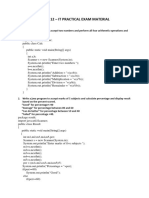0% found this document useful (0 votes)
47 views5 pagesMook1 (Part1)
Java
Uploaded by
enoshmuthyala484Copyright
© © All Rights Reserved
We take content rights seriously. If you suspect this is your content, claim it here.
Available Formats
Download as TXT, PDF, TXT or read online on Scribd
0% found this document useful (0 votes)
47 views5 pagesMook1 (Part1)
Java
Uploaded by
enoshmuthyala484Copyright
© © All Rights Reserved
We take content rights seriously. If you suspect this is your content, claim it here.
Available Formats
Download as TXT, PDF, TXT or read online on Scribd
/ 5






















































































